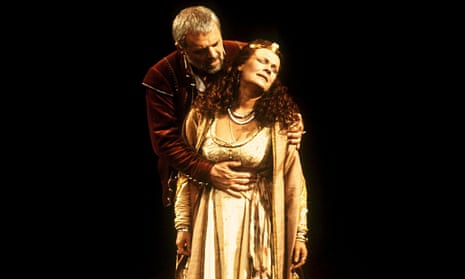In the case of Judi Dench, one is confronted by an embarrassment of riches. I could choose her famous 1976 Lady Macbeth, opposite Ian McKellen, that suggested a terrified apprehension of the satanic powers the thane’s wife has invoked. In that same Stratford season, Dench was also an unforgettable Beatrice to Donald Sinden’s Benedick in Much Ado About Nothing: this was a woman whose bright-eyed merriment concealed a badly bruised heart.
If I finally select her Cleopatra in Peter Hall’s 1987 National Theatre production of Antony and Cleopatra, it’s because the performance contained everything that makes Dench a great actor: her deeply Shakespearean ability to blend the tragic and the comic, her lightning shifts of mood, her capacity to make the verse sound as it sprang from her imagination.
Her initial reaction when Hall cast her as Cleopatra is well known. “I hope you know what you are doing,” she told him. “You are setting out to direct Cleopatra with a menopausal dwarf.” That, of course, was the very last thing we saw. In place of the conventional sultry temptress, Dench gave us a Cleopatra whose sexuality stemmed from her volatility, intelligence and wit: a woman of infinite variety who was enthralling company and an irresistible magnetic force, drawing Anthony Hopkins’s jaded warrior of an Antony back to Egypt.
All the great Dench qualities were there. She caught both the vanity and humour of a Cleopatra who, on being told by a messenger that Antony’s new Roman bride was 30, huffily picked up her skirts and sped for the exit. Dench also showed her matchless ability to shift, in a few moments, from breathy languor to ironic humour and a pensive melancholy as she wanly reflected on “my salad days when I was green in judgment”.
But, for me, the true test of the performance came when Cleopatra is confronted by Antony’s death. I often get restless during the long adagio of that final act. But Dench made one magnificently aware that Cleopatra’s recollection of a heroic Antony (“His legs bestrid the ocean; his reared arm/Crested the world”) was a sustaining fantasy: Dench delivered the words with the fierce intensity and intoxicated rapture of someone reliving a dream.
I am reminded of something the critic James Agate said of one of Dench’s illustrious predecessors, Edith Evans: “That she takes hold of the dramatist’s conception, absorbs it and then gives it out again, re-creating it in terms of her own personality and delighted imagination.” That fits Dench perfectly. In the case of Cleopatra, she took Shakespeare’s character and endowed her with a restless vivacity and emotional ecstasy that must have come both from within Dench herself and her own extensive imagination.

Comments (…)
Sign in or create your Guardian account to join the discussion